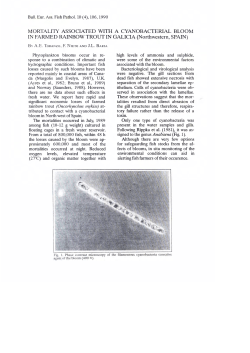
Outcome of the 1st online meeting of Fish
Baltic Marine Environment Protection Commission Group on Ecosystem-based Sustainable Fisheries Online meeting, 18 May 2015 Outcome of the 1st online meeting of Fish Outcome of the first online meeting of the HELCOM Group on Ecosystem-based Sustainable Fisheries In accordance with the Outcome of FISH 2-2015, the first online Meeting of the HELCOM Group on Ecosystem-based Sustainable Fisheries was held on 18 May 2015. The Meeting was attended by delegations from Estonia and Finland. List of Participants is attached as Annex 1. The Meeting was chaired by Mr. Marcin Rucinski, Chair of Fish, and Mr. Dmitry Frank-Kamenetsky, HELCOM Professional Secretary, and Ms. Petra Kääriä, HELCOM Assisting Professional Secretary, acted as secretaries of the Meeting. Agenda Item 1 Adoption of the Agenda Documents: 1-1 1.1 The Meeting adopted the Agenda of the Meeting as contained in document 1-1. Agenda Item 2 Presentation of the latest version of the compromise suggestion by the Chair on the preamble part of the HELCOM draft Recommendation on aquaculture Documents: 2-1, 2-2, 2-3 2.1 The Meeting took note of the comments received to the compromise preamble by the Chair (documents 2-1 and 2-2) and the final version of the compromise suggestion for the preamble part of the Recommendation (document 2-3) and agreed on it as included in Annex 2. 2.2 The Meeting took note of the view expressed by Finland that the discharges of hazardous substances and litter from aquaculture facilities do not seem to remarkably harm the aquatic environment. Agenda Item 3 Further revision of the text Documents: none 3.1 The Meeting took note of the comments received by Germany and encouraged Contracting Parties to prepare accordingly for the HOD 48-2015 and to consider the possibility to lift their study reservations before the Meeting. The Chair encouraged Contracting Parties to be able to find consensus on the issues still outstanding and finalize the draft Recommendation in the Meeting in order to move to the work on BAT and BEP. Agenda Item 4 Discussion on a new follow-up system for the Baltic Sea Action Plan and other HELCOM commitments Documents: none 4.1 The Meeting noted that only few comments have been received to the follow-up system and that they are generic in nature and took note of further comments by Estonia. Page 1 of 4 Outcome of the 1st online meeting of Fish 4.2 The Meeting emphasized the need, expressed by some Contracting Parties, for the Fish Group to have further time for providing comments and discussing the indicators within the follow-up system and agreed that Contracting Parties are to provide their comments on the system by 30 June 2015 to the Secretariat (dmitry.frank-kamenetsky@helcom.fi) according to the template to be prepared and circulated by the Secretariat by 21 May 2015 and noted that an online meeting to discuss the comments received could be organized in early July 2015, if needed. Agenda Item 5 Any other business Documents: none 5.1 The Meeting had no other issues to discuss. Agenda Item 6 Closing of the Meeting Documents: none 6.1 The outcome of the Meeting is available via the FISH 3-2015 Meeting Site in the HELCOM Meeting Portal. Page 2 of 4 Outcome of the first online Meeting of Fish Annex 1 List of participants Representing Chair Chair Contracting Parties Estonia Finland HELCOM Secretariat HELCOM Secretariat HELCOM Secretariat Name Organisation E-mail address Marcin Rucinski Ministry of Agriculture and Rural Development marcin.rucinski@minrol.gov.pl Ulvi Paadam Heikki Lehtinen Ministry of the Environment Ministry of Agriculture and Forestry Ulvi.Paadam@envir.ee heikki.lehtinen@mmm.fi Dmitry Frank-Kamenetsky HELCOM Secretariat Petra Kääriä HELCOM Secretariat dmitry.frank-kamenetsky@helcom.fi petra.kaaria@helcom.fi Page 3 of 4 Outcome of the first online meeting of Fish Annex 2 Compromise suggestion for the specific preamble part of the Recommendation as agreed by the online meeting RECOGNIZING, inter alia, the relevance of direct discharges and losses, nutrients and organic material, from open‐system marine and fresh water aquaculture, as potential negative impacts on the aquatic environment, RESPECTING the need to prevent or defeat other possible environmental pressures and their negative impacts on marine ecosystems that can be associated with aquaculture, such as the introduction of non‐ indigenous species, ecological and genetic impacts on wild fish stocks from unintended releases of farmed fish, introduction of antibiotics and other pharmaceuticals, as well as hazardous substances and litter TAKING NOTE OF: the need for a differentiated approach to specific types of aquaculture production for effective application of BAT and BEP in fresh water and marine fish farming, the need to fill, on a sustainable and ecologically sound basis, the growing gap between general seafood demand and supply, the need for strengthened regional self-supply with aquaculture products and, hence, reduced dependency of global imports, in contributing to global responsibility via use of sustainably developed and managed domestic resources, the possible supporting role of certain extensive aquaculture systems, particularly freshwater ones, in habitat conservation, if developed and maintained sustainably, BEARING IN MIND that aquaculture has globally been the most rapidly growing form of primary food production during the past 30 years, while it was constant or decreasing in the EU and that the industry's technological and functional development has been fast; therefore, ENCOURAGING the industry to realize its great potential to develop and apply environmentally friendly technologies and production methods, both in marine and fresh water, Page 4 of 4
© Copyright 2025










